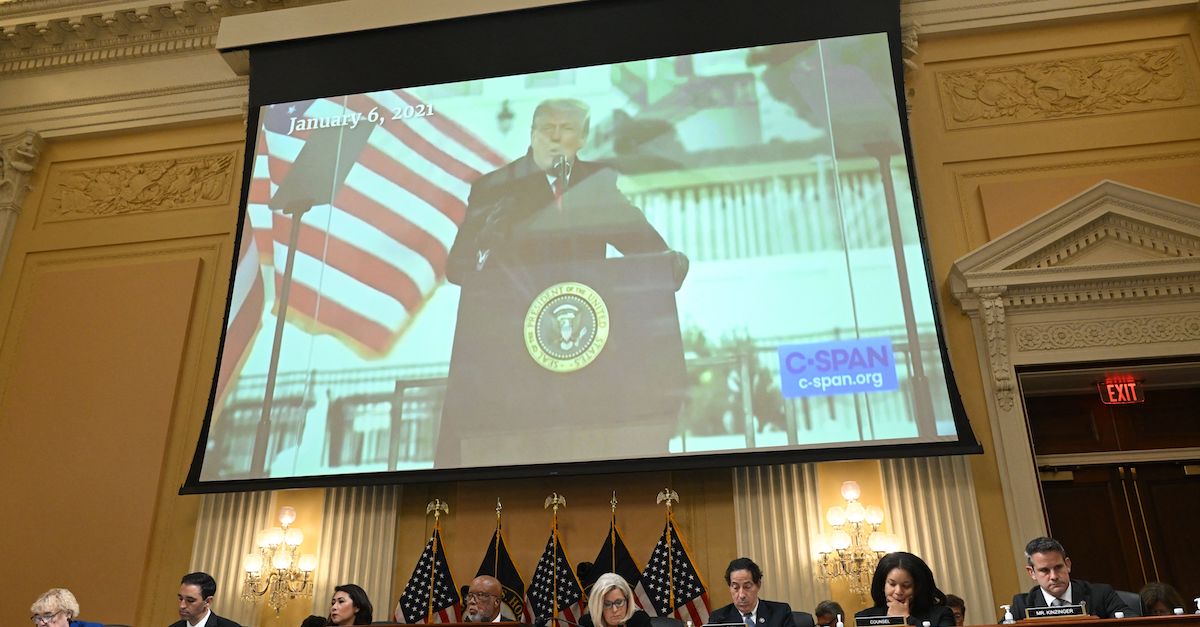
An image of former US President Donald Trump is shown during a full committee hearing on the Jan 6th investigation on Capitol Hill on July 12, 2022, in Washington, D.C.
After his speech at the Ellipse ended approximately 1:10 p.m. on Jan. 6, 2021, former President Donald Trump waited more than three hours before tweeting a video calling for his supporters to go home at 4:17 p.m. Eastern Time. The House committee investigating the Jan. 6 attack on the U.S. Capitol will scrutinize the 187 minutes that passed in between that time on Thursday night.
The prime time hearing, slated to begin at 8 p.m. Eastern Time, is believed to be the last of the committee’s first tranche of hearings.
On Face the Nation on Sunday, Rep. Adam Kinzinger of Illinois — one of two Republicans on the committee — suggested a new set of hearings could follow when the panel releases its report or if new information emerges.
Thursday’s proceedings, however, come with high expectations as the tale the committee has told over eight installments reaches its chronological conclusion.
“The story we’re going to tell tomorrow is that in that time, President Trump refused to act to defend the Capitol as a violent mob stormed the Capitol with the aim of stopping the counting of electoral votes and blocking the transfer of power,” a Select Committee aide told reporters.
During its seventh hearing, the Jan. 6 Committee disclosed that Trump made last-minute changes to his speech and on-the-spot ad libs to inflame the crowd against his then-vice president Mike Pence. Trump changed his approach after Pence announced that he did not have the legal power to unilaterally block the certification of President Joe Biden’s victory, the committee revealed.
Prior hearings also have focused on Trump ignoring entreaties by top staffers and even his son Donald Trump Jr. to denounce the rioters. The committee on Thursday intends to put Trump’s “inaction” under a microscope.
“We’re going to talk about when he was made aware of what was going on Capitol,” an aide said. “We’re going to hear testimony from individuals who spoke to the president. We’re going to hear testimony from individuals who were in the West Wing, were aware of what the President was doing.”
According to the aides, the witnesses will share insights about what Trump’s “aides were doing, what his family [and] his allies were doing — and ultimately show that, despite the tweets from people inside the White House, from people on Capitol Hill [and] from allies elsewhere, the President didn’t tell his supporters to leave the Capitol and go home until 4:17p.m.”
Late last year in December, the committee’s vice chair Rep. Liz Cheney (R-Wyo.) suggested that Trump’s inaction on that day could amount to a serious federal crime.
“Did Donald Trump, through action or inaction, corruptly seek to obstruct or impede Congress’ official proceeding to count electoral votes?” Cheney asked, in a question pointedly designed to resemble the statutory language of obstruction of an official proceeding.
That statute is one of the more common and serious charges on the Department of Justice’s Jan. 6 docket, and a federal judge found — in a civil discovery case — that Trump and his lawyer John Eastman “likely” violated it.
The committee’s chair, Rep. Bennie Thompson (D-Miss.), will lead the proceedings remotely because of his COVID-19 positive diagnosis. Leading the presentation will be a bipartisan duo, Kinziger and Rep. Elaine Luria (D-Va.), an aide said.
On Tuesday, The Guardian first reported that the committee obtained only one text message that it recently subpoenaed from the U.S. Secret Service, following reports that the others from the Jan. 5 and Jan. 6 time frame were wiped. A committee aide confirmed that account to reporters but declined to comment on whether the single message was useful.
“I think that the select committee members have concerns about what we understand to be data migration that took place that affected Secret Service devices,” the aide said. “The members are still determining exactly how to kind of get the information we’re seeking.”
Later on Wednesday, Thompson and Cheney expressed “concerns” about the erasures, suggesting that they may have violated federal law.
“Four House committees had already sought these critical records from the Department of Homeland Security before the records were apparently lost,” they said in a joint statement. “Additionally, the procedure for preserving content prior to this purge appears to have been contrary to federal records retention requirements and may represent a possible violation of the Federal Records Act. The Select Committee is seeking additional Secret Service records as well. Every effort must be made to retrieve the lost data as well.”
In a letter from its assistant director Ronald Rowe Jr. on Tuesday, the Secret Service insisted that its search for documents continues.
(Photo by SAUL LOEB/AFP via Getty Images)